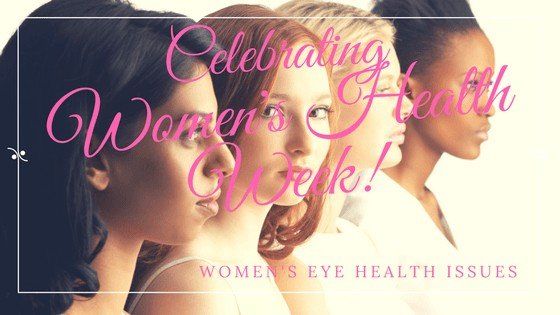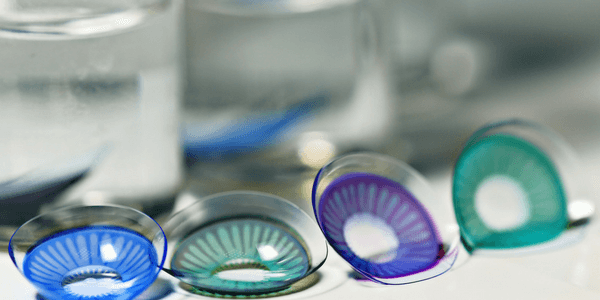Do You Know These Women Specific Eye Health Issues?
In honor of Mother’s Day kicking off Women’s Week, the Eye- Q blog has decided to dedicate a post solely to women’s eye health related issues. So what makes women’s eye health so special? Women are actually more commonly affected than men by a number of ocular health issues including dryness, cataracts, age related macular degeneration, and complications from autoimmune disorders such as Sjogren's or lupus. Furthermore, according to Prevent Blindness America, 66% of people who are blind or visually impaired are women.
Let’s start with that statistic - why are women more at risk for eye complications than men?Hormones
Ladies - is there anything that hormones don’t affect? Your eyes certainly don’t receive any immunity. The fluctuations of estrogen, progesterone, and testosterone caused by everything from pregnancy to hormone replacement therapy can cause a range of symptoms. Let’s take a look.
Hormone Replacement Therapy, Birth Control, & Fertility Drugs
While further research is needed, there is currently a study that suggests a link between long-term oral contraceptive use and a doubled risk for developing glaucoma. Furthermore, birth control and other hormone replacement therapies are also known to cause blood clots and strokes which not only cause vision problems, but can increase a woman’s chance for cataracts and dry eyes. Finally, fertility drugs can cause much of the same issues as oral contraceptives including blurred vision and even spots in vision.
Pregnancy
While the most common vision problems related to pregnancy are temporary such as dryness, prescription changes, eye puffiness, and light sensitivity, other more serious complications warrant the need for closer monitoring. This can include retinal damage due to gestational diabetes or preeclampsia and even an increased risk for retinal detachment. Be sure to contact your eye doctor if you are experiencing any changes in your vision while pregnant especially if you have been diagnosed with diabetes or high blood pressure.
Menopause
The shift in balance between estrogen and progesterone that the body goes through during menopause is responsible for a number of changes to the eyes - most noticeable the eye’s surface. Dry eye syndrome and uveitis (inflammation of the middle layer of the eye) being the most common.
Cosmetic Contact Lens Use
Wearing and caring for contact lenses improperly or without a valid prescription from an eyecare professional can cause a lot of damage to your eyes. Unfortunately, with the popularity of fashion lenses on the rise, colored contacts are widely available through a multitude of somewhat questionable online retailers. Women are often the targets of the marketing for these lenses as they typically go hand-in-hand with popular makeup trends.
Cosmetic Use Around The Eyes
Are you using your cosmetics correctly? Misuse can lead to allergic as well as bacterial infections of the eyes and even scratched corneas. Be sure to never share your makeup with anyone, and wash your brushes regularly. You will also want to avoid waterproof mascara when wearing contacts, and always remove your makeup at the end of the day - no matter how tired you are. Taking these extra steps can help lessen your risk of injury and infection as well as extend the life of your makeup.
Eye Shape
According to a study published by the NIH in 2014, women are more likely than men to develop closed-angle glaucoma (which is the more dangerous form) due to the shape of their eyes lending to a more shallow anterior chamber. Because the anterior chamber is where the eye’s fluid drains to allow for a regulation of the eye’s internal pressure, less space here means more of a chance for this fluid to build up causing pressure and damage to the optic nerve.
Women Live Longer
Numerous studies have come to the conclusion that women do in fact live longer than men. Due to this, women are also more at risk for developing degenerative eye conditions such as macular degeneration and cataracts simply because of the fact that they will be around longer since these conditions occur and worsen with age.
Autoimmune Diseases
Women are more likely than men to develop autoimmune diseases such as lupus, multiple sclerosis, and Sjogren’s Syndrome - all of which can affect vision and eye health. Sjogren’s Syndrome, for example, causes damage to the glands responsible for creating tears which in turn causes severe dryness. Similarly, lupus can also cause dryness as well as painful inflammation of the eyes. Multiple Sclerosis, however, can lead to complications such as loss of color vision and possible permanent vision damage or loss.
What Can You Do?
The good news is, although you might be more at risk for certain eye health disorders, it doesn't mean you will definitely develop these issues or that if you do, you don’t have options to help manage them. Often the best line of defense is one of prevention, so here are a few ways you can stay ahead of any complications.
- Stay on top of your yearly eye health exams. Most eye conditions do not present any symptoms until they have progressed to the point of causing permanent damage and/or vision loss.
- Maintain good physical health with diet, exercise, and regular visits to your primary care doctor.
- Only purchase and wear contact lenses that are approved for your eyes specifically by an eye care professional.
- Practice good cosmetic hygiene by checking for expiration dates on cosmetics, washing brushes regularly, not sharing makeup, and removing makeup at the end of the day.
- Consider taking supplements made specifically for eye health - of course only after speaking to your eye doctor first.
- Give your eyes regular breaks during the day especially if you spend a lot of time on a computer. Utilize the 20-20-20 rule by looking 20 feet away for 20 seconds every 20 minutes.
- Always wear 100% UV protection sunglasses when outside - even in the winter months and on overcast days.
Protect your eyes from the harmful effects of blue light emitted from handheld devices such as cell phones and tablets.
For more information on women specific eye health visit See Jane See - a website founded by Prevent Blindness and dedicated to helping spread awareness of women’s specific eye issues.







